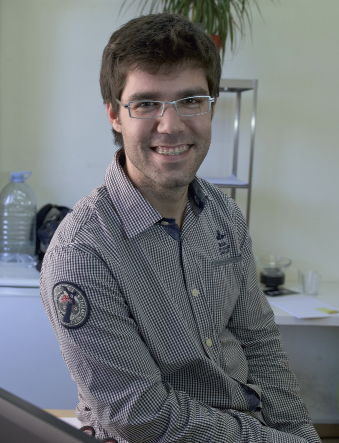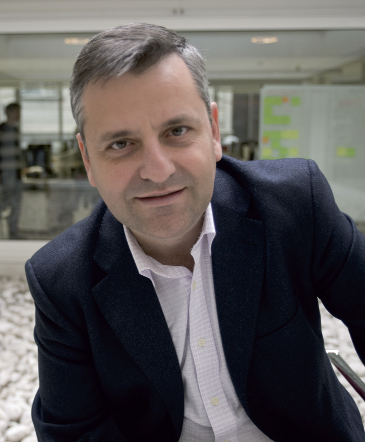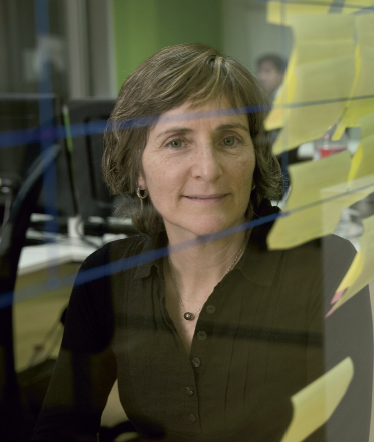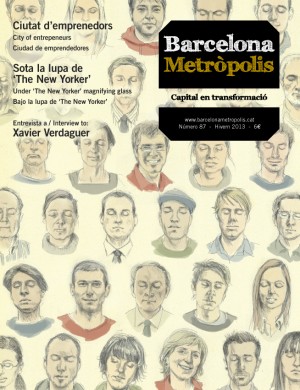The name Jacob Suñol will mean nothing to most of the people reading this. Nor will the names Pere Vallès or Ana Izquierdo. However, they are important people. It is often said that the winner of the elections will be the one to get us out of the recession. However, this recession is so deep that great leaderships are proving to be inadequate. We have to start from scratch.

© Fabiola Llanos
Jacob Suñol, one of the founders of Medtep, a technological platform used to store patients’ health details.
The economic recovery has thousands of unsung heroes – people who risk their own assets to push projects through and generate economic growth and employment. They are the entrepreneurs, a growing group of people driven by the will to move forward and do their bit for economic recovery through their small (or medium-sized or large) companies. Jacob Suñol, Pere Vallès and Ana Izquierdo are, for different reasons which we shall explain later, representatives of this generation that will get us out of the recession.
Catalonia is a country where jobs are in increasingly shorter supply, which makes it even more difficult for those who lose their job to find a new one (at the time of writing the unemployment figure stands at almost 650,000). This is why more and more people are deciding to set up their own companies: if nobody wants to give them a job, then they create their own. In 2011, nearly seven out of every one hundred Catalan adults (6.8%) were involved in the creation of companies, up 35% on the previous year, and this figure is expected to have increased again when the data for 2012 are available. Therefore, in Catalonia there are proportionately more entrepreneurs than in Spain overall (5.8% on average) and than in some countries regarded as benchmarks, such as Sweden (5.8%), Finland (6.3%) and Denmark (4.6%), according to the Global Entrepreneurship Monitor annual report.
Nonetheless, there is still a long way to go. We are still far behind the entrepreneurship rate of countries like the Netherlands (8.2%), the UK (7.3%) and the USA (12.3%). Moreover, according to the latest Doing Business report by the World Bank, Spain is the 136th easiest country in the world for setting up a company, ranking behind countries such as Afghanistan, Kosovo, Morocco and Zambia. “Spain is not Uganda,” said Mariano Rajoy to the minister Luis de Guindos in a famous text message while the bailout of the Spanish banks was being negotiated. We would do well to look at these statistics.
It is clear that more favourable legislation would go a long way to helping people who want to start up a company. In fact, in his election campaign, Rajoy promised that “one of the first things he would do” would be to pass an Entrepreneurs Law, which he has not yet done in his first year in office. However, it is also true that entrepreneurship requires a certain fearlessness when it comes to taking risks and that this mindset cannot be changed overnight, but rather only through cultural change.
“Perhaps a year from now we will no longer exist,” says, rather coldly, Jacob Suñol, one of the young entrepreneurs cited at the beginning of the article. Suñol is one of the examples of this entrepreneurial culture that is not afraid of failure. He is one of the creators of Medtep, a technological platform where doctors and patients can store their medical records and health-related information. Suñol has been working for free for a year and a half now to develop Medtep; nevertheless he is not daunted by the prospect of this, his first entrepreneurial project, failing. Born in 1985, Suñol is still young enough to live with his parents, which helps him to economise. Evidently his intention is for the project to be successful and eventually yield profits, but failure to do so would not greatly bother him.
This mentality, very typical of Silicon Valley (the mecca of entrepreneurship), clashes with the typical mindset of the Catalan businessperson, often somewhat apprehensive. The traditional Catalan business classes take a more conservative approach: they are reluctant to take the risk of floating the company for fear of losing control over it or being exposed to the media.
Catalonia has scores of big companies that the general public is mostly unaware of. Did you know that one of the world’s biggest steel producers is based here? The company is called Celsa, but you have probably never even heard of it. And there are many more like it. They are the so-called hidden champions. The scant reputation of the figure of the entrepreneur in Catalonia may be related to this tendency to camouflage themselves, as if they had something to hide.
While it is true that entrepreneurship is going through a small boom because of the recession, it is not, strictly speaking, a new phenomenon. In fact, the hidden championswe mentioned were driven by entrepreneurs decades ago. Now, the simple fact is that something that already existed is re-emerging. However, even in the years of economic boom, when easy money ruled and the entrepreneurial urge cooled off, some Catalans created innovative companies which nowadays, while many other businesses have gone south, are yielding their fruits. Such is the case of Scytl, a company that gives technological support for e-voting.

© Fabiola Llanos
Pere Vallès, head of Scytl, which administered electronic voting in the recent US election.
Scytl was founded in 2001, and last November it carried out its most ambitious project: managing e-voting in the United States, the world’s leading power. The company was founded by the IT engineer Andreu Riera, now deceased, and is now run by Pere Vallès, who took charge while Riera was still alive. Scytl, which had a turnover of EUR 14.5 million in 2011, has a worldwide market share of 80% in the sector. There are many countries that do not permit e-voting (Spain, as it happens), hence the sector is still somewhat in its infancy. However, Scytl, which encrypts votes to make sure that they are secret and are recorded properly, is better prepared than anyone to lead a new way of voting that guarantees, for example, that a Catalan living in New York is assured of being able to vote in the elections in their country, something which was not necessarily the case in the elections of 25 November last here in Catalonia.
Apart from the logical obstacles that the recession poses for companies, the Catalan entrepreneurial world has another specific problem to solve: the lack of women. Companies are traditionally male-dominated, and particularly in the managerial echelons. This is even more acute in start-ups, that is, new technological companies. Part of this may be due to women’s lack of interest in technological disciplines: only 3% of women who study at university choose technology courses, as opposed to 13% of men. For example, only one in every five entrepreneurs at the LaSalle Technova incubator are women.

© Fabiola Llanos
Ana Izquierdo, creator of two start-ups and the Inveready investment fund, promotes the involvement of women in setting up new technology enterprises.
Ana Izquierdo, creator of two start-ups and of the Inveready investment fund, is one such person in Barcelona who is trying to increase women’s participation in the creation of new technological companies. To this end she has created the Ellas 2.0 forum, a platform that pursues this goal by promoting companies led by women and by organising monthly networking sessions in the Velódromo bar. The meetings she organises allow entrepreneurs to carry out networking and “realise that they are not alone”, which helps them gain self-confidence. Izquierdo firmly believes that “successful female entrepreneurs deserve exposure” so that other women will be inspired by them and will follow suit.




Penso que tot i tenin la crisis que estem patin sense precedents, voldria que la” paret mestre” de la nostre societat, sobre la qual s’apoyessin totes les altres questions, sigues, la “cultura i la educació”